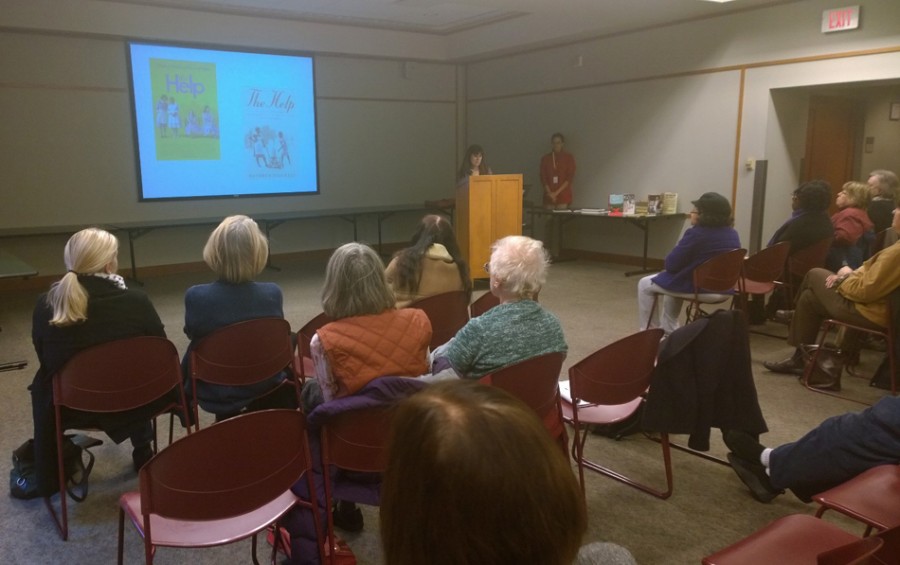History professor discusses missing perspectives in ‘The Help’
Madeline Fox/The Daily Northwestern
Local professor Joan Marie Johnson speaks to Evanston residents about perspectives not included in the bestselling novel “The Help.” The history professor talked about black female activists, including Rosa Parks and and Septima Clark.
November 9, 2014
A history professor spoke to more than 30 people at the Evanston Public Library on Sunday about the experiences and perspectives author Kathryn Stockett left out of her bestselling novel “The Help.”
Joan Marie Johnson, a history professor from Northeastern Illinois University who specializes in women’s, African-American and Southern history, presented as part of EPL’s “11 Months of African American History” program.
The program consists of at least one African-American history and culture-themed program or speaker every month, from March 2014 through January 2015. Lesley Williams, the head of adult services at the library, came up with the program to extend African-American programming beyond African-American History Month in February, she said.
“February has become the programming ghetto for African-American history, and then it’s as though African-American history and art don’t exist for the rest of the year,” Williams said.
When Johnson offered to present a talk on “The Help,” Williams said she thought it would fit in with the program.
Although Johnson talked shortly about the life of African-American domestic workers outside of how they were portrayed in “The Help,” her presentation focused on black women who were activists in the Jim Crow South, specifically in Mississippi and South Carolina.
“I am glad Stockett pushed so many people to think about black domestic workers in Mississippi,” Johnson said. “However, Stockett leaves out other significant groups from her story, including African-American women in the middle class and those who were activists.”
Johnson recounted the lives of many African-American women activists, including Rosa Parks, NAACP activist Modjeska Simkins and teacher Septima Clark.
“Hopefully we’ll seek out more stories like this to understand the richness and diversity of black women’s stories,” Johnson said.
Skokie resident Marc Arenberg, a graduate student at Northeastern Illinois, said the presentation appealed to him because of his own specialty in African-American history and civil rights.
“It’s a subject that interests me, and I’m excited to see what she has to say about it,” Arenberg said before the presentation. “I’m particularly interested in this presentation because I’ve taken classes with her.”
Evanston resident Theresa Cameron (Communication ’88), another attendee, said she read “The Help” and was interested in hearing more about the voices not included in the novel.
“The book was entertaining, but the presentation added more substance,” Cameron said. “It was exciting because it brought in people of more relevance.”
For Williams, the people whose perspectives weren’t incorporated in the book included characters whose lives were seen through the lens of white people.
“There should be more stories from the point of view of the oppressed groups,” Williams said. “In stories like ‘The Help’ and ‘To Kill a Mockingbird,’ the only reason you should care about civil rights is that it helps young white people become a better person.”
In her talk, Johnson agreed, questioning the role of the white female protagonist as a go-between to connect the audience with the titular help.
“I wondered, as I read ‘The Help,’ ‘Do we actually need to have Skeeter?’” Johnson said.
The library’s 11 Months of African American History series will continue Nov. 17 with a discussion of August Wilson’s “King Hedley II,” a play about a black man recently released from prison who is trying to rebuild his life in Pittsburgh’s Hill District.
Email: [email protected]
Twitter: @MadelineFox14


